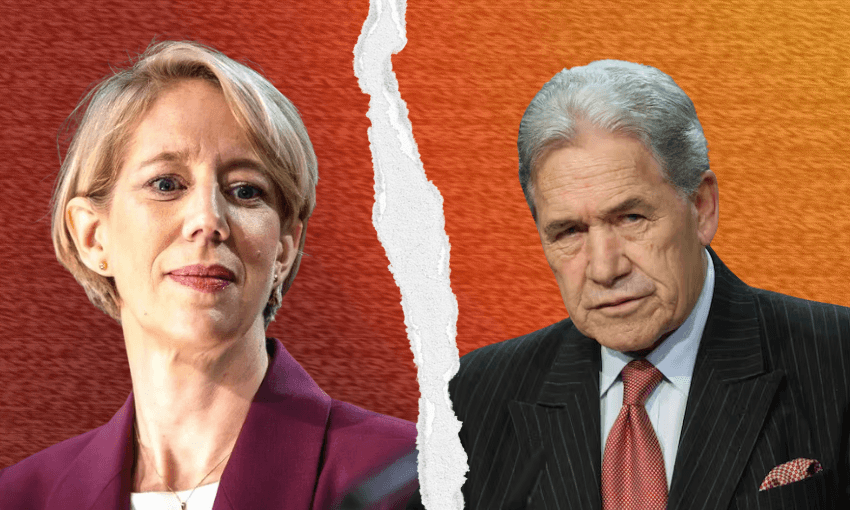In a year that has seen a worldwide decline in sales, H&M’s New Zealand business has remained relatively buoyant. But local workers say they’re not being compensated fairly, and went on strike today to demand change. Michael Andrew and Leonie Hayden report.
Employees of Swedish retailer H&M took strike action in Auckland today to protest what they say is low pay and unfair work conditions. The global retailer, second largest in the world, has been accused of understaffing its New Zealand stores since Covid-19 emerged, forcing workers to take on multiple roles beyond their job descriptions. Around 20 workers and FIRST Union representatives gathered outside Auckland’s flagship Commercial Bay store this afternoon to pressure the fashion giant to pay a living wage – $22.10 per hour.
“These workers have had enough!” FIRST Union organiser Nathalie Jaques told passing customers and commuters to a considerable amount of tooting. “These are poverty wages from a giant company that can afford to pay the living wage.”
Workers and union representatives have been engaged in extended negotiations with H&M, which has offered to increase the pay of new workers to $20.20 per hour – 20c above the minimum wage. The wages of employees of longer than a year would increase from $20.55 to $21.30 per hour.
However, Jaques told The Spinoff this pay offer did not reflect the workload employees were dealing with, nor did it match the recent commitment from other large retailers such as Kmart and Bunnings to pay the living wage
“H&M is not coming to the table in the same way. Other employers are recognising that the living wage is what they need to pay. H&M is an industry outlier at this point.”
The ongoing campaign for the living wage resulted in 14 H&M workers being suspended last month. “H&M will ask them to work on the frontline during a pandemic but doesn’t think they are worth a living wage – that’s an employer telling their staff that their wellbeing is of no value whatsoever and they are disposable as the products they sell,” said Jaques.
She said one of the most common complaints from H&M workers was understaffed stores, which was forcing fewer workers to do more than was acceptable. She said the Commercial Bay store once had 13 visual merchandisers but that was now down to three.
Mackenzie O’Sullivan, union delegate for the Commercial Bay store, said the stress from understaffing was leading to an even higher turnover, which was in turn becoming a health and safety issue for the remaining employees.
“The main thing we’re disputing is pay, but also the understaffing problems. A lot of us are living paycheque to paycheque. We don’t want to just survive, we want to live! Also the understaffing is leading to higher stress levels and problems with mental and physical health.
“We’re asking for a living wage and more staff. But what we’ve found is that team members are being replaced but their hours aren’t being matched, so we’re continuing to drop hours which adds extra responsibility to current staff, who again, aren’t being compensated for the extra work.”
Despite the fewer staff, O’Sullivan said the Commercial Bay store has been meeting its budget, so he wasn’t convinced by H&M’s explanation that it couldn’t pay more because its profits had been crippled by Covid-19.
“As a global retailer that makes literally millions of dollars, I do think that they should have taken responsibility.
“The family that owns H&M are all, independently, billionaires, so it’s weird they can support their own wealth to such extremes but can’t top up their workers wages to minimum wage.”
Like many other retail businesses, Covid-19 did take a heavy toll on H&M’s finances over the past year, with global sales down 20% from 2019. However, while as many as 1800 stores around the world have remained closed and seen a halt in sales due to the pandemic, New Zealand’s have been able to remain open and continue trading for the majority of the year. Sales at the New Zealand business actually increased from $67m in 2019 to $74m in 2020, and three new stores were opened throughout the year. With the rise of ecommerce and a gradual quelling of Covid-19, H&M Group CEO Helena Helmersson has said the global business is well positioned for a strong recovery during 2021.
Jaques said that optimistic picture was evidence the company was in a fine position to pay its New Zealand workers a wage that reflected their performance and loyalty throughout the pandemic. H&M hired people on the premise that there would be career progression opportunities, but these promises were seldom honoured, she said.
Commercial Bay store retail assistant Jade Hunter, who was at the protest, said she’d worked at the store for three years, and had only received a slight increase – despite being promised by management that the pay would always be $1 over the minimum wage. Since the lockdowns and a hiring freeze last year, she had seen her workload increase dramatically, and sometimes had to cover entire departments and management tasks by herself.
“It’s so busy. They’ve got me training people. I’m not trained or paid for that.”
She said the store’s management was generally caring and receptive to workers’ complaints, but they didn’t have any power to action the changes, instead having to defer up the chain to the company’s corporate managers.
H&M has been approached for comment.



